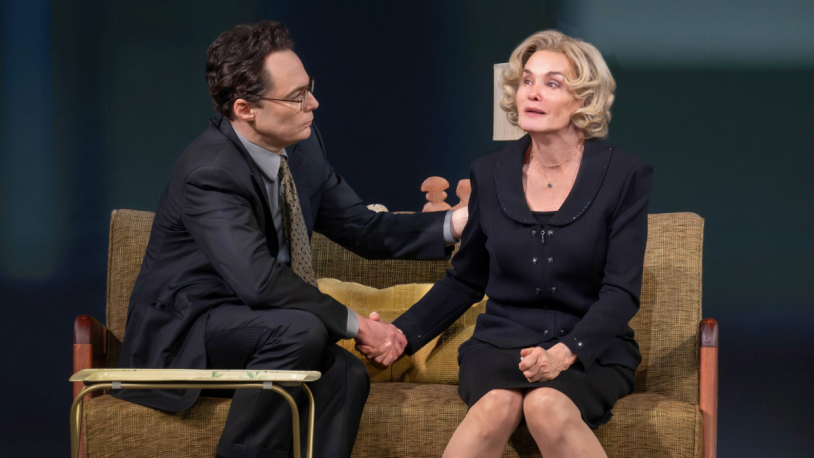When we first meet Jessica Lange’s Phyllis in the new Paula Vogel drama Mother Play, she is a recent divorcée in 1964 Washington, DC, embittered about the breakup of her marriage to “that son of a bitch” and struggling to raise two young children on a government typist’s salary. She’s radiates a certain Southern grace, delighting in a second-hand Chanel suit from a thrift store and turning to an endless stream of martinis to cope with her depleted circumstances. It’s a meaty role, and Lange tears into it with genteel ferocity as we follow her over the course of decades — up to her dementia-marked appearance in a retirement home.
Mother Play, which opened Thursday at the Hayes Theater, is a three-person memory play with an autobiographical bent that echoes Vogel’s 1992 breakout, The Baltimore Waltz, which depicted a devoted sister’s vigil at the deathbed of her gay brother Carl. (Vogel’s real-life brother Carl died of complications from AIDS in 1988.) Carl reappears here, played by Jim Parsons with a swishy precociousness that gradually settles into more mature self-confidence as he moves from adolescence into adulthood. And so does the Vogel stand-in, here named Martha and played with a stoic forthrightness by the remarkable Celia Keenan-Bolger in the finest performance of her career. It’s heartbreaking to watch how she endures Phyllis’s blatant favoritism toward Carl — right up until the time that he publicly comes out as a gay man while in college and Phyllis callously cuts him out of her life.
Keenan-Bolger remains devoted to her brother, but also assumes the role of mediator between mother and son even as she is frustrated by her perennial status as second-best child. (When Phyllis learns of Martha’s own sapphic preferences, the daughter’s rejection follows with predictable near-finality.) But Martha finds that she still can’t quite quit her mother for good — and Lange manages to draw this momster with shades of context and empathy that mitigate our instinctual revulsion.
The problem is that this is all pretty familiar territory — and you can see many of the story beats coming from miles away. As in The Baltimore Waltz, Vogel veers into the fantastical — but the family’s battle with cockroaches in a succession of crummy apartments feels like it’s part of another play. (Shawn Duan’s animated projections, alternately creepy and cutesy, suggest a stage adaptation of Disney’s A Bug’s Life.)
There are other curious choices too. Director Tina Landau also has the actors shuffling furniture and appliances around the stage on hand-carts, reinforcing Martha and Carl’s transient childhood but also encumbering the performers with a lot of stage business even after their lives have settled down and the grownup melodrama kicks into higher gear. Even more oddly, we see Lange pantomime her boozing, sipping from empty glasses, while a later sponge bath scene uses actual water to great effect.
Despite Lange’s best efforts, including an overlong and wordless scene in which she makes herself a TV dinner and stews in her self-inflicted loneliness, we never get a handle on her character. The Phyllis we first meet is a borderline alcoholic, downing five martinis in an evening, but that thread is mostly unexplored. The bigger issue, I suspect, is that we never see Phyllis interact with anyone besides her children (aside from one-sided phone calls to a landlord and her apparently traditional mother). Is her objection to her kids’ homosexuality borne of religious conviction or maintaining perceived societal norms? Did she have friends or co-workers she was trying to impress, who provided company as her kids left the house? Did she pursue relationships with other men after her marriage’s collapse — and why not given the times and the promise of financial stability? For a woman who admits she lacks a maternal instinct — “I never wanted to be a mother,” she confides at one point — Phyllis is curiously without any backup plan or alternate vocation, even after achieving willful independence from her kids.
As a result, Mother Play presents a blinkered portrait of an interesting but flawed heroine. And those limitations dull the impact of the show’s final scenes, as Lange and Keenan-Bolger stumble toward something that might look like reconciliation if you squint hard enough. It’s a bittersweet ending, instead of a devastating one.

